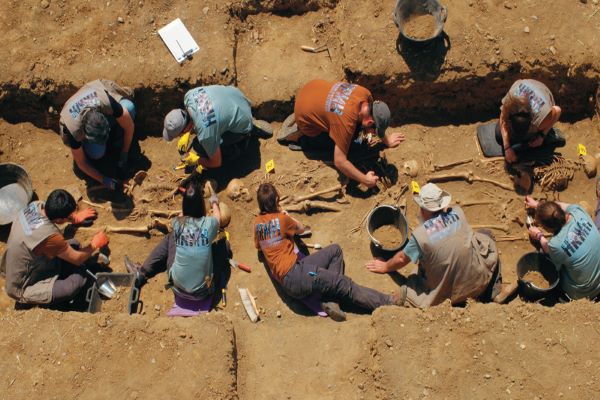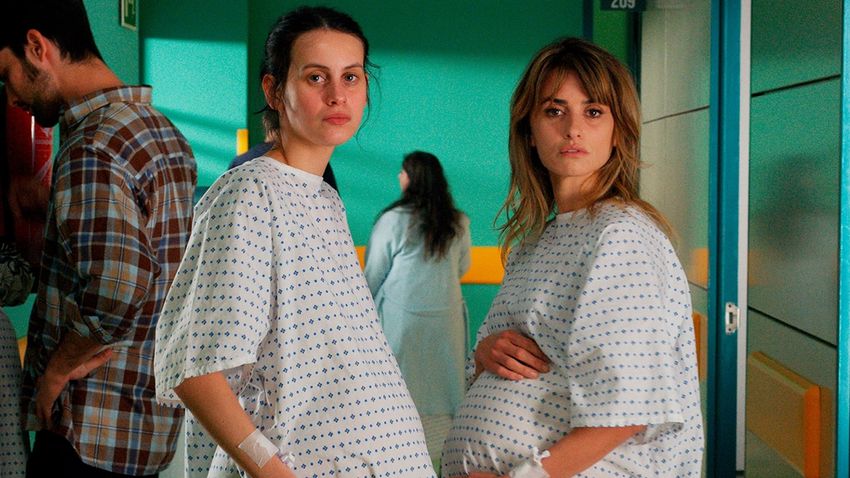Pedro Almodovar’s Parallel Mothers largely focuses on his favorite subject motherhood. But, this film is not a story of a single mother, but rather a story of two mothers. Even though the title of the film suggests their parallel lives, their lives do not remain parallel but intersect and assimilate with each other. Parallel Mothers is also not restricted to contemporary mothers but Almodovar draws parallels to the suffering and toughness of mothers in earlier days as well. This film highlights the tortured, devastated, and oppressed motherhood during the Spanish Civil War. Through this film, Almodovar touches upon multiple important issues like the oppression and torture during the Spanish Civil War, the suffering of countless single mothers, the rights of children, the responsibility of parents, the expression of homosexuality, and the overall toughness and struggle of women.
The film starts with a photo shoot in Madrid where a lady photographer named Janis (Penelope Cruz) is capturing multiple poses of a forensic anthropologist named Arturo (Israel Elejalde). Janis asks him if his organization can help in excavating a mass grave in her village where many men including her great grandfather were brutally murdered and buried during the infamous Spanish Civil War. Arturo and Janis come close to each other and fall in love. They have sex and Janis gets pregnant. Much against Arturo’s wishes, Janis decides to keep the baby and raise it alone. Arturo does not want a baby as his wife is undergoing chemotherapy. However, he loves Janis.

Janis shares the hospital room with a teen would-be single mother named Ana (Milena Smit). Despite their age difference, they soon become friends and deliver babies at the same time. When the observation period of the babies gets over, Janis and Ana leave the hospital but decide to stay in touch. One day, Arturo visits Janis and their daughter Cecilia at Janis’ Madrid apartment. Much to her surprise, Arturo doubts that he is the actual father of the baby. Even though Janis shows strong displeasure toward him, she gets the maternity test done and the reports clearly show with 100% probability that she is not Cecilia’s biological mother. She is utterly shocked and devastated but does not reveal it to anybody. She changes her contact number.
Months later, Janis meets Ana by chance at the cafe where she works. Janis comes to know from Ana that she has left home as her mother does not really care about her or her baby as she is continuously busy acting and traveling with a theater group. Another devastating news she gets from Ana is that her baby Anita has died due to crib death. After seeing Anita’s photograph, Janis is quite confirmed that she was her baby and their babies were swapped in the hospital. She consoles Ana and offers her a housemaid job. Ana reveals to her that she got raped and pregnant by her classmates and her father forced her to keep quiet to avoid press attention. Without revealing the purpose, Janis collects saliva samples from Ana and Cecilia for the maternity test, which confirms that Ana is her biological mother. Ana and Janis come closer and engage in an impromptu sexual activity. However, Janis starts avoiding Ana’s sexual advances.
When Janis reveals to Ana that she is the biological mother of Cecilia, Ana gets furious and leaves Janis’ house with Cecilia. However, she calms down the next day and tells Janis that she can visit Cecilia anytime she wants. The excavation project gets approved and Arturo visits Janis’ village with the full excavation team. The villagers pay their last respects to the exhumed remains of their loved ones. Janis tells Ana that she is three-month pregnant and the baby will be named Ana if it is a girl and Antonio if it is a boy.

Pedro Almodovar draws parallels to mothers across timelines in Parallel Mothers. He hints at and shows the agonies of countless single mothers whose husbands were killed by Franco’s forces during the Spanish Civil War. When the life partner is brutally killed, it is not easy to cope with life and raise children all alone. Life crumbles in front of their eyes. The major fight remains for survival and earning a livelihood. Though the situation is not the same for contemporary mothers, they have their agonies and struggle too. Even at this age, Ana is almost abandoned by her parents. Her mother is mostly busy acting and does not care much about her and her baby Anita. Her father even forces her not to reveal and report the rape incident to avoid press attention. Personal trauma can’t be worse than that. Janis’ partner Arturo wants to get the baby aborted and she decides to walk her path alone. So, the agonies and trauma of mothers continue now as well. Almodovar establishes a connection among mothers across ages through this film. Parallel Mothers shows glimpses of their struggle, trauma, love, betrayal, abandonment, survival, and multiple facets of life.
Parallel Mothers is mostly an Almodovarian film. The film is filled with the signature styles of Almodovar like melodramatic structure and dialogues, gorgeous production design, the use of vibrant colors, and an emotional background score. The production design including the set decoration is beautiful and elegant. Almodovar’s frequent collaborator Alberto Iglesias’ sentimental music resonates with the emotional subject of the film. Penelope Cruz and Milena Smit brilliantly portray the struggle and pain of single mothers. Parallel Mothers was nominated for the prestigious Golden Lion award at the 78th Venice International Film Festival where Penelope Cruz won the Volpi Cup award for Best Actress. Alberto Iglesias was nominated for Best Original Score and Penelope Cruz was nominated for Best Actress at the 94th Academy Awards.
